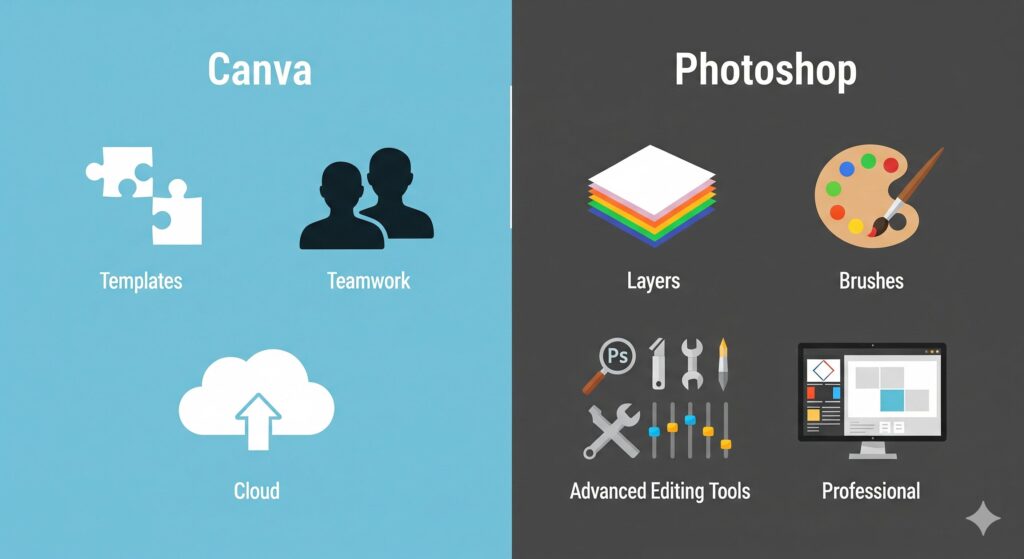In 2025, the battle of Canva vs Photoshop continues to be one of the hottest debates in the design world. With visual content now ruling social media, marketing, and even education, choosing the right design tool has never been more important. Whether you’re a beginner making your first Instagram post, a student preparing a project, or a professional designer creating high-quality graphics, the decision often comes down to Canva or Photoshop.
Both platforms offer powerful features, but they serve very different audiences. Canva focuses on simplicity and accessibility, while Photoshop delivers unmatched editing depth and creative control. Yet, this very difference makes the choice confusing for many. Should you prioritize ease of use and ready-made templates, or invest time (and money) in mastering a professional-grade tool?
This guide will break down the pros, cons, features, pricing, and real-world use cases of each—helping you decide which design software fits your needs in 2025.
Quick Comparison Table (At a Glance)
Here’s a quick side-by-side look at Canva vs Photoshop, so you can see the differences at a glance:
| Feature | Canva | Photoshop |
| Ease of Use | Beginner-friendly, drag-and-drop | Steep learning curve, pro-level tools |
| Templates | Thousands of ready-to-use templates | No built-in templates (create from scratch) |
| Photo Editing | Basic adjustments (filters, crop, text) | Advanced retouching, layers, color grading |
| Collaboration | Cloud-based, real-time team sharing | Limited, best for solo professionals |
| Pricing | Free + Pro plan ($12.99/month) | Subscription ($20.99/month) |
| Best For | Students, marketers, small businesses | Photographers, agencies, professional artists |
What is Canva?
Launched in 2013, Canva quickly became the go-to design tool for beginners, students, and small businesses who need professional-looking graphics without learning complex software. It runs directly in your browser or app, making it highly accessible.
Who Uses Canva?
- Students creating presentations or posters
- Marketers designing social media campaigns
- Small businesses making logos, flyers, and business cards
- Content creators who need fast, ready-made templates
Strengths of Canva
- ✅ Easy-to-use drag-and-drop editor
- ✅ Thousands of templates across different categories
- ✅ Affordable pricing (Free plan + Canva Pro at $12.99/month)
- ✅ Works on web, iOS, and Android
Weaknesses of Canva
- ❌ Limited advanced editing compared to Photoshop
- ❌ Less control over individual design elements
- ❌ Not ideal for professional photographers or complex artwork
What is Photoshop?
Adobe Photoshop has been the industry-standard design and photo-editing software for decades. It’s a professional-grade tool used worldwide for creating everything from logos and posters to digital art and high-end photo retouching.
Who Uses Photoshop?
- Graphic designers working on branding and creative projects
- Photographers editing and retouching high-resolution images
- Agencies producing print and digital media campaigns
- Professional artists creating detailed illustrations
Strengths of Photoshop
- ✅ Advanced photo editing and retouching capabilities
- ✅ Layer-based editing for complex designs
- ✅ Huge range of brushes, filters, and effects
- ✅ Seamless integration with other Adobe Creative Cloud apps
Weaknesses of Photoshop
- ❌ Expensive (subscription starts at $20.99/month)
- ❌ Steeper learning curve for beginners
- ❌ Requires a powerful computer for smooth performance
- ❌ Less collaborative than Canva (unless paired with Adobe tools)
Canva vs Photoshop: Feature-by-Feature Comparison
When comparing Canva vs Photoshop, it’s important to break down how they perform across different areas—ease of use, design tools, editing power, collaboration, pricing, and overall performance. This helps users pick the right tool based on their actual workflow needs.
Ease of Use & Learning Curve
- Canva: Designed for beginners, Canva’s drag-and-drop interface requires no prior design knowledge. Most users can create social media posts, flyers, or presentations within minutes. Its low learning curve makes it perfect for students, marketers, and casual creators.
- Photoshop: While extremely powerful, Photoshop has a steep learning curve. Mastering layers, masks, and advanced tools can take weeks or even months of training. Professionals value this depth, but beginners may find it overwhelming at first.
Design Tools & Templates
- Canva: Comes loaded with thousands of templates for social media, business cards, resumes, posters, and more. It’s a fast, efficient solution for users who need ready-to-publish designs. However, customization is limited compared to professional tools.
- Photoshop: Offers complete freedom to design from scratch. From pixel-perfect graphics to complex artwork, Photoshop provides unmatched control. Unlike Canva, it doesn’t rely on templates, making it the top choice for professionals who want precision.
Photo Editing & Retouching
- Canva: Suitable for quick edits like cropping, applying filters, adjusting brightness/contrast, and adding text. It’s ideal for non-technical users who just want to enhance images before sharing online.
- Photoshop: The global leader in photo editing, Photoshop offers advanced tools for retouching, color grading, object removal, and detailed adjustments. It’s the go-to choice for photographers, digital artists, and agencies.
Collaboration & Workflow

- Canva: Built for teamwork, Canva lets multiple users collaborate in real-time. Teams can share folders, leave comments, and co-edit designs—making it perfect for remote teams, agencies, and classrooms.
- Photoshop: Primarily designed for solo professionals, though it integrates with Adobe Creative Cloud for cloud storage and sharing. While powerful for individual work, it’s not as collaborative as Canva out of the box.
Pricing & Affordability
Here’s a quick breakdown of Canva vs Photoshop pricing in 2025:
| Tool | Pricing Model | Cost (2025) | Best For |
| Canva Free | Free | $0 | Beginners, casual users |
| Canva Pro | Subscription | $12.99/month | Small teams, businesses |
| Photoshop | Subscription | $20.99/month | Professionals, agencies |
💡 Verdict: Canva is budget-friendly and accessible, while Photoshop is pricier but offers industry-standard features.Cross-Platform & Performance
- Canva: Works directly on the web, with mobile apps for iOS and Android. Since it’s cloud-based, it runs smoothly on most devices without needing heavy system resources.
- Photoshop: Available on Windows, macOS, and iPad. While powerful, it requires a strong computer with sufficient RAM and storage. Performance can slow down on low-spec systems, especially with large projects.
Best Use Cases: Who Should Choose What?
Choosing between Canva vs Photoshop ultimately depends on your needs, skill level, and budget. Both tools serve different purposes, so here’s who should use each:

- Canva is best for:
- 🎓 Students → Quick assignments, posters, resumes.
- 📈 Marketers → Social media graphics, ad creatives, email banners.
- 🏢 Small business owners → Flyers, business cards, brand kits without hiring designers.
- 📱 Social media creators → Ready-to-use Instagram, TikTok, and YouTube templates.
- Photoshop is best for:
- 📸 Photographers → Advanced photo editing, retouching, and color grading.
- 🎨 Graphic designers → Logos, web design, complex illustrations.
- 🏢 Agencies → Professional-level projects that require industry-standard quality.
- 🖌 Professional digital artists → Detailed artwork, painting, and illustration.
👉 Verdict: If you need quick, polished designs, Canva is unbeatable. But if you want maximum creative control, Photoshop is still the king.Alternatives to Canva and Photoshop (2025)
While Canva vs Photoshop is the most common debate, several alternatives in 2025 may fit your workflow better:
- Figma → Best for UX/UI design and real-time collaboration.
- Affinity Photo → A one-time purchase alternative to Photoshop with pro features.
- GIMP → Free, open-source image editor; powerful but less user-friendly.
- PicMonkey → Great for quick, social media-ready edits.
- Crello (VistaCreate) → Similar to Canva, offers templates and animations.
💡 When these shine: If you’re on a tight budget, need real-time team collaboration, or want a one-time purchase option instead of subscriptions, these alternatives may be a smarter pick.Canva vs Photoshop: Pros & Cons Summary
Here’s a quick pros & cons table for readers who want an at-a-glance decision:
| Tool | Pros | Cons |
| Canva | Easy to use, thousands of templates, affordable, cloud-based. | Limited advanced editing, less control, internet needed. |
| Photoshop | Industry standard, unmatched editing tools, advanced creative freedom. | Expensive, steep learning curve, requires powerful PC. |
FAQs
Is Canva better than Photoshop for beginners?
Yes. Canva is much easier to use for beginners thanks to its drag-and-drop interface, ready-made templates, and low learning curve.
Can Photoshop do everything Canva does?
Technically, yes—but it takes more time and skills. Photoshop can replicate Canva’s templates, but Canva offers them instantly.
Which is more affordable long-term: Canva or Photoshop?
Canva Pro costs $12.99/month, while Photoshop is $20.99/month. Canva is more affordable, but Photoshop offers unmatched professional tools.
Do professionals use Canva?
Yes, many marketers, social media managers, and small businesses use Canva. However, most designers and photographers still prefer Photoshop.
Can Canva fully replace Photoshop?
No. Canva is excellent for quick designs, but Photoshop is essential for advanced editing, detailed artwork, and professional-grade projects.
Which is better for social media content: Canva or Photoshop?
Canva is better for fast, ready-to-post social media content, while Photoshop is ideal if you want unique, high-quality, and fully customized designs.
Is Photoshop worth the price in 2025?
Yes, if you’re a professional photographer, designer, or artist. For casual users, Canva offers better value.
Conclusion
When it comes to Canva vs Photoshop, there’s no one-size-fits-all answer. Canva shines for beginners, students, and marketers who need quick, easy, and affordable designs. Photoshop, on the other hand, remains the gold standard for professional photo editing, graphic design, and advanced creative projects.
👉: Canva is perfect for simplicity and speed, while Photoshop is unbeatable for precision and power. Choose the tool that fits your workflow, budget, and long-term goals—you really can’t go wrong with either.READ MORE ARTICLES
Midjourney vs. Stable Diffusion: Which AI Art Generator is Right for You? (2025 Guide)
Notion vs. Obsidian: The Ultimate Guide to Building Your Second Brain (2025)
Huion vs XP-Pen: The Best Budget Drawing Tablet for Beginners (2025)
Huion vs Wacom (2025): Which Tablet Is Best for Beginners & Professionals?
